RingConn Gen 2 Review: The Smart Ring that Won’t Drain Your Wallet (Or Battery)
The RingConn Gen 2 is a sleek titanium smart ring that tracks your sleep, recovery, and daily stress—without charging a monthly fee to access your data. If you’re more interested in long-term health insights than step counts or workout stats, it’s a more affordable alternative to the Oura Ring 4 and Ultrahuman.
Unlike most sleep-tracking smart rings on the market, it also tracks breathing patterns that could signal sleep apnea. While it’s not a medical device, it calculates an AHI (Apnea-Hypopnea Index) score—potentially helping you decide if a formal sleep study is worth considering.
This review breaks down what the RingConn Gen 2 gets right, where it falls short, and whether it’s actually worth your money.
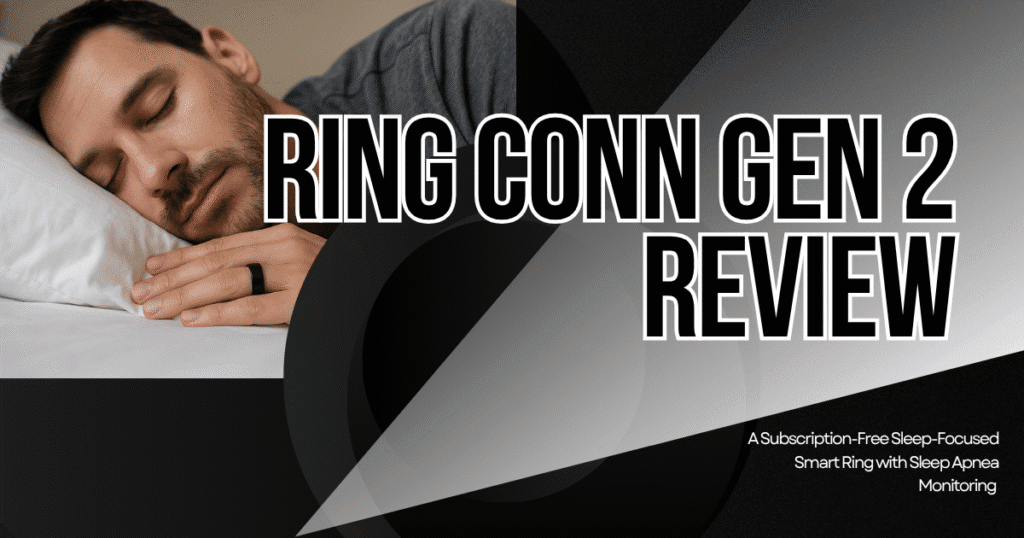
Disclosure: This article is reader-supported and contains affiliate links. As an Amazon Associate we may earn a small commission on qualifying purchases at no extra cost to you.
RingConn Gen 2 Smart Ring Review: At A Glance
| Price | $299 (one-time, no subscription) |
|---|---|
| Battery Life | 10–12 days per charge |
| Charging Case | Provides 12–15 full recharges |
| Charging Time | Approx. 85 minutes via USB-C |
| Material | Titanium alloy |
| Thickness | 2.5mm |
| Water Resistance | 100 meters (suitable for swimming) |
| Sleep Apnea Detection | Yes (includes AHI score) |
| App Integration | Apple Health (partial), Google Fit (limited) |
| Subscription | None required |
| Available Finishes | Matte Black, Silver, Rose Gold, Royal Gold |
Check Latest Price & Promotions →
RingConn Gen 2 Price: No-Subscription Smart Ring Cost
With the RingConn Gen 2, you pay $299 upfront and own everything—no monthly fees to access your sleep data or health insights. Most smart rings lock their best features behind $5.99/month subscriptions, which adds up over time.
The RingConn also comes in cheaper than the Oura Ring 4 ($349+)—and buyers who aren’t interested in sleep apnea monitoring can find even more savings with the new $199 RingConn Gen 2 Air.
The app isn’t as refined or as connected to other health platforms as some alternatives. But for most users, it delivers what matters: accurate sleep tracking, daily recovery insights, and long battery life—without adding another monthly bill to your budget.
RingConn Gen 2 Design and Comfort: 24/7 Wearability Review
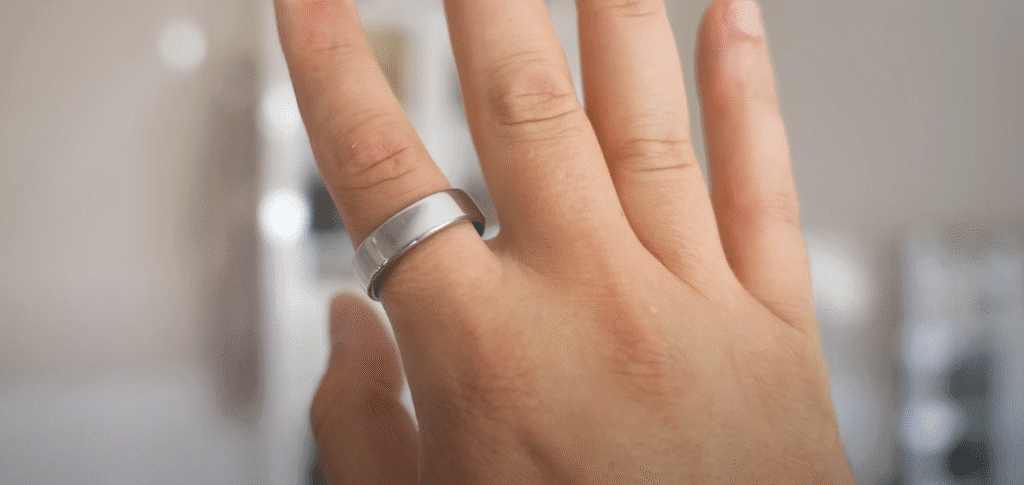
The titanium construction keeps the smart ring lightweight at 2–3 grams and just 2.5mm thick—thinner than most wedding bands. Most people forget they’re wearing it after the first few days, which is exactly what you want from something you’ll wear 24/7.
The rounded interior prevents pressure points during sleep, and the 100-meter water resistance means you can swim and shower without taking it off.
Four finishes are available if you care about aesthetics: matte black, silver, rose gold, and royal gold.
What I love about the discreet design is that it allows you to wear something more subtle than a smartwatch—especially if you prefer wearing traditional watches or jewelry on your wrists.
That said, there’s one detail you’ll want to get right before slipping it on.
Be Careful With Sizing—Here’s How to Get It Right
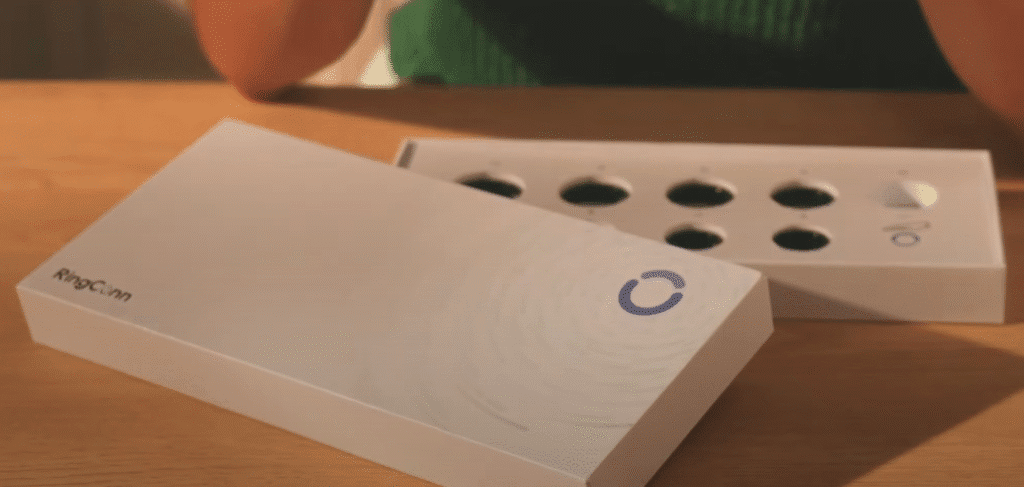
Sizing is one area to pay close attention to. Several users mentioned that the included sizing kit didn’t perfectly match the fit of the final ring. Some found they needed to go one size up to account for finger swelling—especially overnight, when hands naturally retain more fluid.
Since smart rings can’t be adjusted like watch bands, getting the right fit upfront is important. I recommend wearing the sample rings from the sizing kit for a full day and night to test for swelling and comfort.
If you’re between sizes or unsure, it’s generally recommended choosing the slightly larger size. This small step can help you avoid the hassle of an exchange.
RingConn includes a free sizing kit so you can confirm your fit before the ring ships. Simply select “I don’t know my size” at checkout.
Shop RingConn Gen 2 (sizing kit included)
RingConn Gen 2 Battery Life: 10-Day Smart Ring Performance
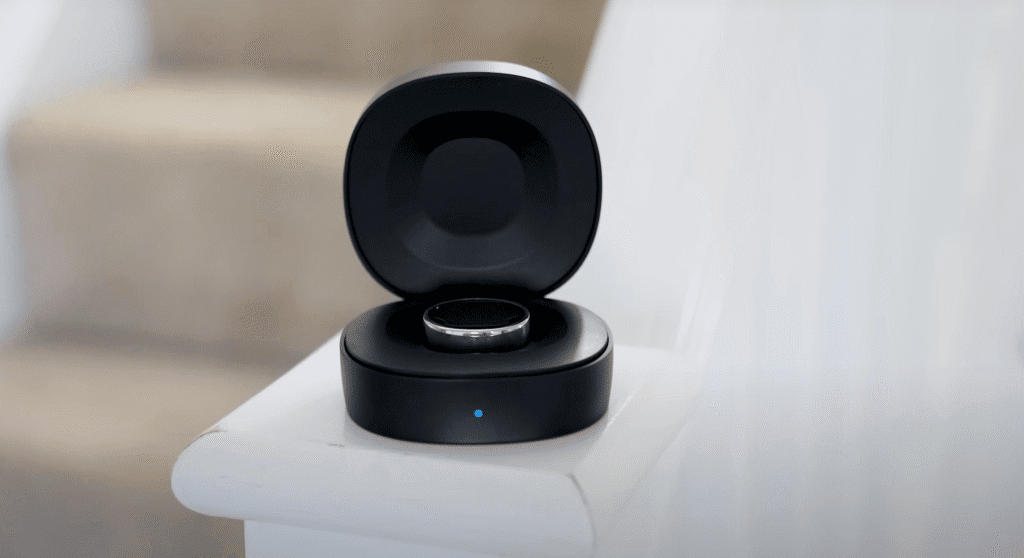
RingConn claims 10–12 days of battery life per charge—and in most cases, it delivers. If you’re used to charging a smartwatch every night, this feels like a real upgrade. The included USB-C charging case stores 12–15 full recharges, so you can go weeks or even months without needing a wall outlet.
Charging takes around 85 minutes, and there’s no proprietary cable to deal with—just a standard USB-C port, which keeps things simple.
Compared to the Oura Ring Gen 3, which typically needs charging every 4–7 days, RingConn’s longer battery life is great for anyone who doesn’t want another device constantly plugged in.
RingConn Gen 2 Review: Sleep Tracking and Apnea Detection
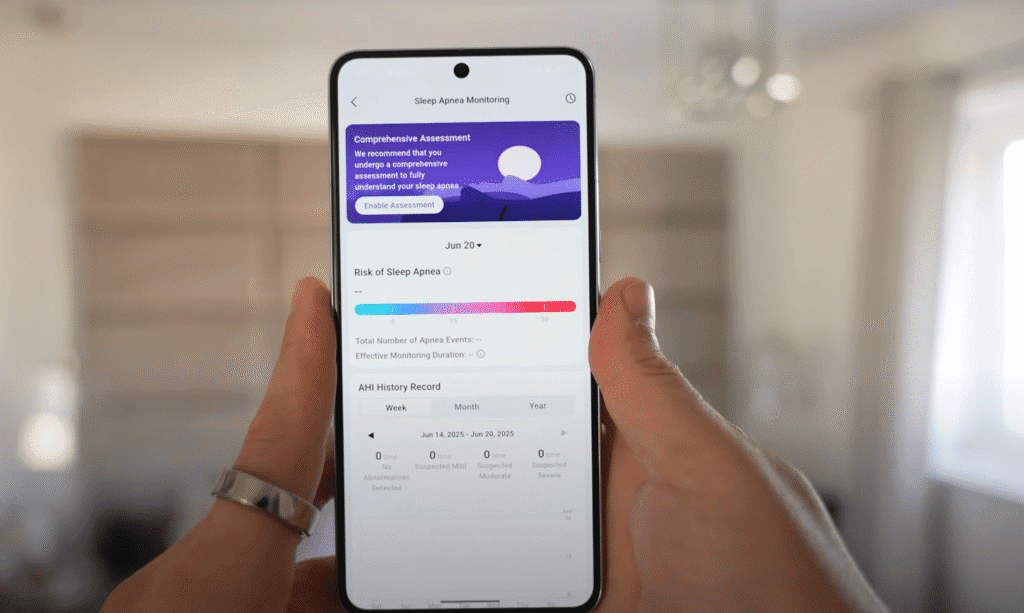
Sleep Tracking Accuracy: How Well Does RingConn Gen 2 Monitor Your Sleep?
Sleep tracking is the RingConn Gen 2’s strongest feature. The ring detects when you fall asleep within 5–10 minutes and breaks down your night into deep, REM, and light sleep stages. For most people, the sleep duration and timing line up with how rested they feel the next day, making it a reliable way to track sleep over time.
It’s also comfortable enough for all-night wear. The lightweight titanium build and smooth interior mean there are no pressure points, even if you shift positions during the night.
Sleep Apnea Detection with RingConn Gen 2: What the AHI Score Actually Shows
What makes this ring different from other sleep-tracking wearables is its ability to monitor breathing patterns and calculate an AHI (Apnea-Hypopnea Index) score—the same metric used in clinical sleep studies. While it’s not a medical device, some users have found the data lines up fairly well with results from formal sleep labs.
If you’re managing sleep apnea with CPAP therapy, it can be a useful way to track how consistent your breathing is overnight. It’s also a discreet option for shift workers who need silent sleep tracking without a bright screen or vibration alert.
Temperature Trends and Sleep Environment: How RingConn Tracks the Full Picture
The RingConn also logs overnight temperature trends, which can help you spot shifts related to your room environment, illness, or changes in recovery. It’s a subtle detail, but useful when viewed alongside your sleep stages.
One thing to keep in mind: the ring sometimes logs quiet wakefulness—like reading or watching TV while lying still—as light sleep. It’s a common limitation in many consumer sleep trackers, and something you should be aware of.
Start monitoring your sleep patterns tonight with the RingConn Gen 2 →
RingConn Gen 2 Activity Tracking: Reliable for Movement, Limited for Workouts
RingConn automatically logs steps, calories, and general movement throughout the day. Heart rate tracking is fairly accurate at rest and during light activity—usually within 2–3 bpm of other wearables.
But once intensity ramps up, I’ve noticed that it starts struggling to keep up with its accuracy. During high-effort workouts, heart rate readings can lag by 15–40 bpm, especially above 110 bpm. This makes it a consideration for anyone who trains by heart rate zone or tracks intervals closely.
For casual users, though, it still works well for monitoring daily movement, recovery patterns, and stress trends. If you’re already using a smartwatch or chest strap during workouts, RingConn can complement that with 24/7 tracking without the bulk.
RingConn Gen 2 App: What’s In, What’s Missing, and What’s Coming
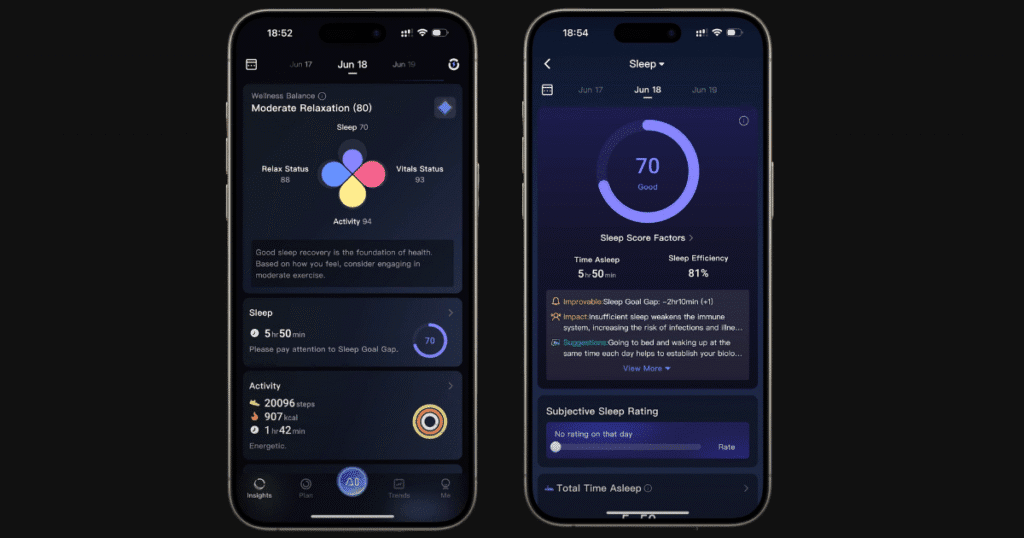
The RingConn app displays daily scores for sleep, readiness, activity, stress, heart rate, and SpO₂, through a straightforward interface. You’ll get weekly and yearly reports to track longer-term trends, plus an AI Health Partner that offers personalized suggestions—all without requiring a subscription.
Data sync and platform integration:
- Apple Health integration works well. Sleep data, heart rate, and blood oxygen readings transfer reliably.
- Google Fit connectivity works too, though some people report occasional delays or missing data points.
- Health Connect support is planned for late 2025.
- Your data stays on the ring for up to 7 days and syncs via Bluetooth when you open the app.
Interface and insights: The recent app redesign introduced a “flower petal” dashboard that shows four main metrics at once. Some people find it cluttered, while others like having everything visible without scrolling. The AI-generated summaries help you understand patterns without digging through charts, though you might notice occasional translation quirks.
What’s missing: There’s no open API for exporting data to third-party tools, and workouts need to be logged manually—the smart ring won’t detect them automatically. Beyond Apple Health and Google Fit, ecosystem integrations are limited. VPN connections or weak networks can also cause sync issues that require manual reconnection.
Bottom line: Works well for casual health tracking with a clean, ad-free experience. If you need deep integrations, automatic workout detection, or extensive data export options, you’ll find the app limiting.
RingConn Gen 2 Review: Daily Readiness and Stress Monitoring
The RingConn’s readiness score combines sleep, HRV, and stress data to give you a sense of how recovered you are each morning. Most people find these scores line up well with how they actually feel each morning, which makes them useful for deciding whether to push hard or take it easy.
When the app detects poor sleep or elevated stress markers, it suggests dialing back your activity level. It’s not as sophisticated as dedicated training platforms, but the guidance helps prevent overtraining and optimize your energy for when it matters most.
Stress tracking runs continuously in the background, revealing patterns you might not notice otherwise. After a few weeks, you’ll start seeing trends—like stress spikes during afternoon meetings or tension building on certain days of the week. These insights can help you identify specific triggers and adjust your routine accordingly.
Bottom line: Solid for general wellness guidance and stress awareness, though serious athletes will want more detailed recovery metrics from dedicated training platforms.
RingConn Gen 2 vs Other Smart Rings: Comparison Chart
| Feature | RingConn Gen 2 | Oura Ring Gen 3 | Ultrahuman Ring Air |
|---|---|---|---|
| Price | $299 (no subscription) | $299–$549 + $5.99/mo | $349 + optional subscription |
| Battery Life | 10–12 days | 4–7 days | 4–6 days |
| Charging Case | Yes (12–15 full charges) | No | No |
| Sleep Tracking | Yes | Yes | Yes |
| AHI Score (Sleep Apnea Indicator) | Yes | No | No |
| Stress Monitoring | Yes (HRV-based) | Yes | Yes |
| Heart Rate Accuracy (Exercise) | Low above 110 bpm | Moderate | High (optimized for training) |
| Workout Detection | No | Yes | Yes |
| Temperature Tracking | Yes | Yes | Yes |
| SpO₂ Tracking | Yes | Yes | Yes |
| App Integration | Apple Health, Google Fit (partial) | Apple Health, Google Fit | Apple Health, Google Fit |
| Available Finishes | Matte Black, Silver, Rose Gold, Royal Gold | Silver, Black, Stealth, Gold | Black, Silver |
Other Smart Ring Alternatives
- Apple Watch Series 10: Better fitness tracking, GPS, and health features, but bulkier for sleep tracking.
- Whoop 4.0: Better for athletes, but has a strap format without a screen and requires a subscription.
- Fitbit Charge 6: More detailed fitness tracking at a similar price point, cannot track sleep apnea.
Who Should Buy the RingConn Gen 2 Smart Ring?
The RingConn Gen 2 is a good fit if you:
- Want reliable health and sleep data without paying a monthly subscription
- Work night shifts or irregular hours and need silent, screen-free sleep tracking
- Wear a traditional watch and don’t want to give up wrist space to a fitness tracker
- Prefer a one-time purchase over ongoing app fees
- Are curious about breathing patterns during sleep and want non-medical insights that may help you decide if you’d like to take an at-home sleep test
You may want to consider alternatives if you:
- Are an athlete who needs precise workout heart rate monitoring
- Are a techy smart ring user who wants extensive app ecosystem integration
- Prefer highly polished, feature-rich applications
- Need automatic workout detection
- Prefer to have data portability across platforms
RingConn Gen 2 Review: Final Verdict & Where to Buy
If you want a smart ring that reliably monitors sleep and recovery without locking features behind a subscription, then the RingConn Gen 2 is hard to beat. With a 10-day battery, AHI sleep apnea tracking, and full access for a one-time price, it’s a solid alternative to Oura and Ultrahuman for anyone looking for comprehensive overnight health data.
It won’t replace a sports watch for workouts, but if sleep is your main concern, this is one of the best no-subscription smart rings you can buy.
People Also Asked
What does RingConn Gen 2 do?
The RingConn Gen 2 tracks sleep stages, heart rate, HRV, stress, activity, and overnight breathing. It also calculates an AHI score to help users monitor potential signs of sleep apnea, all without a subscription.
What’s the difference between RingConn Gen 2 and Gen 2 Air?
The Gen 2 includes full sleep and breathing analytics, while the Gen 2 Air removes the blood oxygen and respiratory monitoring features. Both offer the same design, battery life, and basic tracking.
What finger is the best for the RingConn Gen 2?
The index or middle finger is usually best for accurate readings. These fingers have stronger blood flow, which helps improve heart rate and oxygen data.
Is RingConn better than Oura?
RingConn is better if you want full access without paying monthly. Oura offers a more polished app and better fitness features but locks insights behind a $5.99/month subscription.
Can you shower with RingConn 2?
Yes, the RingConn Gen 2 is water-resistant up to 100 meters. It’s safe to wear while showering, swimming, or washing hands.
Can I wear my RingConn in the ocean?
Yes, you can wear the RingConn Gen 2 in the ocean. It’s rated for up to 100 meters of water resistance, but rinsing it with fresh water afterward is recommended.
Which tracking ring is the best?
The best tracking ring depends on your needs. For subscription-free sleep tracking, RingConn stands out. For deeper fitness metrics and integrations, Oura or Ultrahuman may be better.
Does the RingConn measure blood pressure?
No, the RingConn Gen 2 does not measure blood pressure. It tracks heart rate, HRV, SpO₂, and sleep-related metrics, but not blood pressure.
Does RingConn tell you if you are getting sick?
RingConn can show early signs through elevated heart rate, stress, or temperature changes. While it doesn’t diagnose illness, changes in your readiness score may indicate something is off.
How accurate is RingConn Gen 2?
RingConn is accurate for sleep staging, heart rate, and HRV under normal conditions. It may underreport heart rate during intense workouts but performs reliably during rest and sleep.
Does the RingConn Gen 2 need a subscription?
No, all features of the RingConn Gen 2 are available without any extra subscription fees.
Is the RingConn Gen 2 Air any good?
Yes, the RingConn Gen 2 Air is a solid budget-friendly smart ring. It offers core health tracking features like sleep, heart rate, and SpO₂, but omits advanced sensors like AHI breathing analysis to keep the price lower.
Related Reading
- Best Sleep Tracking Devices
- Whoop Sleep Tracker Review
- Best Wedge Pillows for Sleep Apnea
- Pulsetto Review
- Best Beds for Sleep Apnea
- Best Sleep Aids for Night Shift Workers
Health Disclaimer: The information in this article is for educational purposes only and is not intended as medical advice. The RingConn Gen 2 is not a medical device and should not be used to diagnose, treat, or monitor any medical condition, including sleep apnea. Always consult a qualified healthcare provider before making changes to your health routine or interpreting wearable device data as clinical information.
